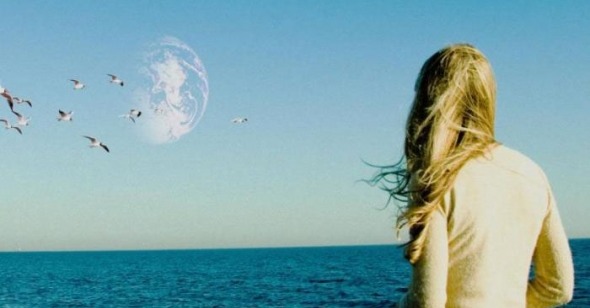A World Apart
By Michael Nordine
Another Earth
Dir. Mike Cahill, USA, Fox Searchlight
At first, Mike Cahill's Another Earth appears to announce itself as a treatise on regret via the lingering consequences of a fatal car accident. Over its ninety-minute runtime, however, Cahill's film is gradually revealed to be more concerned with redemption and the possibility of a new start. This comes in the form of the title planet, a literally extraterrestrial body which, over the course of four years, drifts ever closer toward earth until it's a constantly looming presence in both the day- and nighttime skies. Despite serving as the backdrop of countless scenes, the uncanny sight of Earth 2 never quite loses its power. Almost immediately, it becomes inextricably linked to remorse and forgiveness; the above-mentioned car wreck occurs immediately after the discovery of the planet, when 17-year-old Rhoda (an excellent Brit Marling, who co-wrote the screenplay with Cahill) drives head on into a car carrying a family of three. Already her fate is interwoven with that of Earth 2: the faint blue dot that she's gazing at instead of the road changes her world well before it changes anyone else's. Contemporary celestial films such as Contact and Moon have proven best when their sci-fi trappings are a means of drawing us in to a more personal story rather than an end in and of themselves, and Another Earth distinguishes itself by being centered around a character who actually deserves the attention we’re asked to give her. This isn’t owed to the particulars of Rhoda’s situation as much as to her nuanced, largely internalized response to it.
One of the most poignant moments in Andrei Tarkovsky's Solaris comes when the cosmonaut Snaut remarks that, “We don't want any more worlds, only a mirror to see our own.” Another Earth delivers both. Yet the reflection it casts is imperfect, and Rhoda finds her equal not in a duplicate self but rather in John (William Mapother), the man whose life she irrevocably alters. The sole survivor of the wreck that claimed the lives of his pregnant wife and son, he's as grief-stricken as Rhoda and, thus, the only one with whom she's willing or able to forge a meaningful connection. Everybody else, from her parents to whatever friends she may have had pre-accident, barely register as an afterthought. John and Rhoda's relationship, which takes the usual route of hesitation to comfort to romance, is a study in what two fractured spirits hide from one another, and what they reveal. It's only through the intermediary of a game of Wii Boxing that they're finally able to nudge closer together, and every step thereafter is less and less reticent until finally they let each other in. “I don't mind the cold,” Rhoda tells John. Though this no doubt makes it easier for her to brave the long winter months, its more telling effect is in acclimating her to a life lived at arm's length from everyone around her.
In order to remind us of Earth 2's effect on the world outside of Rhoda, Cahill occasionally touches on the public’s polarized reactions to the discovery—street-corner prophets preach the end-time message in tinfoil hats as others walk around clad in green alien masks—but Another Earth is ultimately more fascinated by micro than macro. Its focus is the ways in which this event both does and doesn’t change its main characters’ lives. People still go through the motions every day, remarking on Earth 2 in passing the way they might a senate race in another state or a sporting event halfway around the world. Nearly every man and woman in the film assumes, correctly, that the discovery will have little to no bearing on his or her own life—this sort of thing always affects someone else. And there, over and over again as Rhoda walks the streets of New Haven, Connecticut in slow-motion—always in wide-angle, always with her face in profile—is the planet whose ultimate narrative importance can be boiled down to the fact that it embodies an opportunity for Rhoda to do what she most desires: start anew and leave behind the life for which she’s little use or hope. Cahill gives us reason to be compelled by her not only because she is that “someone else” but, more to the point, because she's as universal as she is peculiar. Rhoda is idealistic but grounded, flawed but sympathetic, and punishes herself more harshly than the penal system that jailed her for four years. Each of her shortcomings (to say nothing of her alcohol-induced crime) is more than tempered by her painful self-awareness, and the viewer is likely to forgive her long before she forgives herself.
Midway through the film, John invokes the Allegory of the Cave in an attempt to sway Rhoda from applying to an essay contest whose prize is a trip to Earth 2. “I don’t think we're ready for what’s out there,” he says to her. He’s hardly alone. In a rare moment of melodrama, we learn that one of Rhoda’s colleagues has poured bleach into his eyes and ears in order to blind and deafen himself not only to the outside world but also to the awareness of his own being. Everything he does thereafter, from recognizing Rhoda merely by touch to assessing her life, is overly sagacious. Though an exaggerated example, he’s nevertheless effective in furthering the case for Rhoda’s uniqueness. What neither he nor John nor anyone else ever fully grasps is that Rhoda’s intrepidity, wrought as it is by sorrow and a lack of any alternative mindset, is not to be swayed. Her lonely meandering from place to place, thought to emotion is, if not quite alien, then certainly strange enough to give casual observers pause. What occurs within those individual moments is likely to be dictated by the precise look in Rhoda’s eyes or the words she can’t quite seem to say, most of which are best left unspoken.
